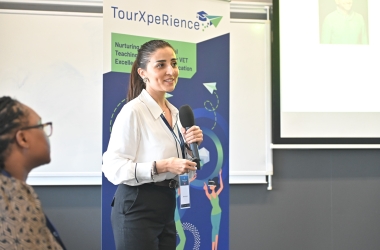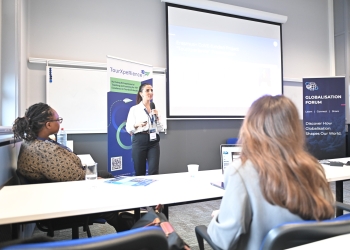TourXpeRience Latest: Showcasing XR-Enhanced Tourism Education at TPM and Globalisation Forum

From Kickoff to TPM: Key Milestones in the TourXpeRience Project
Wittenborg continues to drive innovation in vocational tourism education through the Erasmus+ project Nurturing Entrepreneurial Teaching and Learning for VET Excellence in Tourism Education (TourXpeRience). The project aims to modernise VET in tourism through Extended Reality (XR) technologies, including Augmented Reality (AR), Virtual Reality (VR), and Mixed Reality (MR), equipping learners with future-ready digital and sustainability skills.
After launching in Palermo, Italy, earlier in 2025—marking Wittenborg’s largest Erasmus+ initiative to date—20 partners from nine countries (Italy, Spain, Greece, Germany, the Netherlands, Slovenia, Portugal, Austria, and Poland), including universities, VET institutions, research centres, SMEs, and chambers of commerce, established the strategic framework for integrating XR into tourism curricula and promoting sustainable, entrepreneurial learning across Europe.
Building on its strong start, Wittenborg participated in the second Transnational Project Meeting (TPM), held online from 25 to 26 September and organised by CEIPES. Around 30 representatives joined the two-day meeting to review project progress, align deliverables, and coordinate next steps across all work packages.
Jian Liu, Erasmus+ Project Administrator & Researcher at Wittenborg, emphasised the productive nature of the meeting: “The meeting allowed clear alignment on deliverables and deadlines. What stood out most was the shared commitment to maintaining high standards through structured peer review and progress monitoring.”
Key insights from the TPM highlighted the importance of integrating quality assurance early in the development process and establishing shared responsibility among partners.
Research Insights Shared at Wittenborg’s Globalisation Forum
In November 2025, Wittenborg further showcased the project during its Globalisation Forum, where faculty members Carlos Roos, Emmah Muchoki, and Aydan Holtrigter delivered a research presentation detailing the project. Their session provided students and attendees with a deeper understanding of the project’s goals, research findings, and expected impact on tourism VET.
The presentation underscored:
- Why the project matters: The tourism sector lacks standardised training pathways and requires continuous adaptation to digitalisation, sustainability pressures, and evolving customer expectations.
- How the project responds: By updating VET curricula with digital and sustainability skills, providing XR-based learning resources, and supporting educators through professional development.
- Expected impact: More engaging learning experiences, stronger digital competencies, improved environmental awareness, and a mindset geared towards sustainable entrepreneurship.
The research also addressed broader drivers such as the European Green Deal, the Sustainable Development Goals (SDGs), and OECD recommendations on digital and green transitions. Structured recommendations were shared for teachers, VET institutions, and policymakers across the four stages of XR integration: Planning, Design, Implementation, and Evaluation.
Milestones Achieved in Work Package 2 (WP2): Market Trends and Training Guidelines
Work Package 2 also made significant progress in establishing the project’s research foundation, successfully finalising two key deliverables that underpin the strategic framework for XR integration.
The first deliverable is a comprehensive analysis of the sector’s needs, resulting in the Market Trends and Skills in the Tourism Sector report. This document synthesises extensive data from surveys and focus groups to identify critical gaps in green and digital competencies among VET students and professionals.
Building on these insights, WP2 also produced the Guidelines for the Development of XR Training Modules report, which establishes a pedagogical framework and evaluation criteria for embedding immersive technologies such as VR and AR into tourism curricula. Together, these outputs provide the evidence base required to design relevant, future-ready training modules in subsequent project phases.
WUP 26/11/2025
by Erene Roux
©WUAS Press


